
Paul Douglas Westphal was an American basketball player and coach.
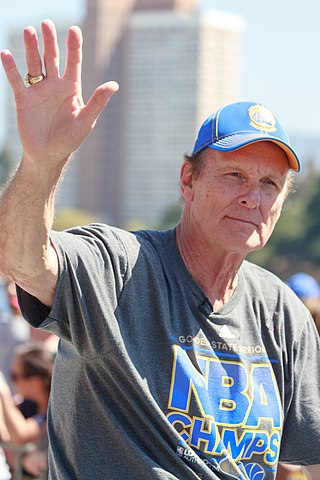
Richard Francis Dennis Barry III is an American retired professional basketball player who starred at the NCAA, American Basketball Association (ABA) and National Basketball Association (NBA) levels. Barry ranks among the most prolific scorers and all-around players in basketball history. He is the only one to lead the National Collegiate Athletic Association (NCAA), ABA, and NBA in points per game in a season. He ranks as the all-time ABA scoring leader in regular season and postseason (33.5) play, while his 36.3 points per game are the most in the NBA Finals history. Barry was also the only player to score at least 50 points in a Game 7 of the playoffs in either league until Stephen Curry and Jayson Tatum both reached that mark in 2023. He is one of only four players to be a part of a championship team in both leagues.

William Theodore Walton III was an American professional basketball player and television sportscaster. He played college basketball at the University of California, Los Angeles (UCLA) and in the National Basketball Association (NBA) for the Portland Trail Blazers, San Diego / Los Angeles Clippers, and Boston Celtics. He is a member of the Naismith Memorial Basketball Hall of Fame and the National Collegiate Basketball Hall of Fame.

Vernon Earl Monroe is an American former professional basketball player. He played for two teams, the Baltimore Bullets and the New York Knicks, during his career in the National Basketball Association (NBA). Both teams have retired Monroe's number. Due to his on-court success and flashy style of play, Monroe was given the nicknames "Black Jesus" and "Earl the Pearl". Monroe was inducted into the Naismith Memorial Basketball Hall of Fame in 1990 and the International Sports Hall of Fame in 2013. In 1996, Monroe was named as one of the 50 Greatest Players in NBA History, and in 2021, Monroe was named as one of the 75 greatest players in NBA history.

Elgin Gay Baylor was an American professional basketball player, coach, and executive. He played 14 seasons as a forward in the National Basketball Association (NBA) for the Minneapolis/Los Angeles Lakers. Baylor was a gifted shooter, a strong rebounder, and an accomplished passer, who was best known for his trademark hanging jump shot. The No. 1 draft pick in 1958, NBA Rookie of the Year in 1959, 11-time NBA All-Star, and a 10-time member of the All-NBA first team, Baylor is regarded as one of the game's all-time greatest players. In 1977, Baylor was inducted into the Naismith Memorial Basketball Hall of Fame. In 1996, Baylor was named as one of the 50 Greatest Players in NBA History. In October 2021, Baylor was again honored as one of the league's greatest players of all time by being named to the NBA's 75th Anniversary Team. Baylor is the leader for most career rebounds in Lakers franchise history with 11,463.
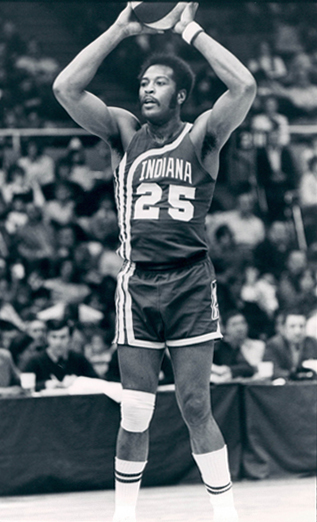
Gus (Honeycomb) Johnson Jr. was an American college and professional basketball player in the National Basketball Association (NBA) and American Basketball Association (NBA). A chiseled 6 ft 6 in (1.98 m), 235-pound (107 kg) forward who occasionally played center, Johnson spent nine seasons with the Baltimore Bullets before he split his final campaign between the Phoenix Suns and ABA champions Indiana Pacers. He was a five-time NBA All-Star before chronic knee issues and dubious off-court habits took their tolls late in his career.

Walter "Clyde" Frazier Jr. is an American former professional basketball player of the National Basketball Association (NBA). As their floor general and top perimeter defender, he led the New York Knicks to the franchise's only two championships, and was inducted into the Naismith Memorial Basketball Hall of Fame in 1987. Upon his retirement from basketball, Frazier went into broadcasting; he is currently a color commentator for telecasts of Knicks games on the MSG Network. In 1996, Frazier was honored as one of the league's greatest players of all time by being named to the NBA 50th Anniversary Team. In October 2021, Frazier was again honored as one of the league's greatest players of all time by being named to the NBA 75th Anniversary Team.Walt Frazier was also named the MVP of the first of two All-Star games played between ABA and NBA players in May of 1971.

Jamaal Abdul-Lateef, better known as Jamaal Wilkes, is an American former basketball player who was a small forward in the National Basketball Association (NBA). A three-time NBA All-Star, he won four NBA championships with the Golden State Warriors and Los Angeles Lakers. Nicknamed "Silk", he was inducted into the Naismith Memorial Basketball Hall of Fame.

Robert Allen McAdoo Jr. is an American former professional basketball player and coach. He played 14 seasons in the National Basketball Association (NBA), where he was a five-time NBA All-Star and named the NBA Most Valuable Player (MVP) in 1975. He won two NBA championships with the Los Angeles Lakers during their Showtime era in the 1980s. In 2000, McAdoo was inducted into the Naismith Basketball Hall of Fame. He was named to the NBA 75th Anniversary Team in 2021.
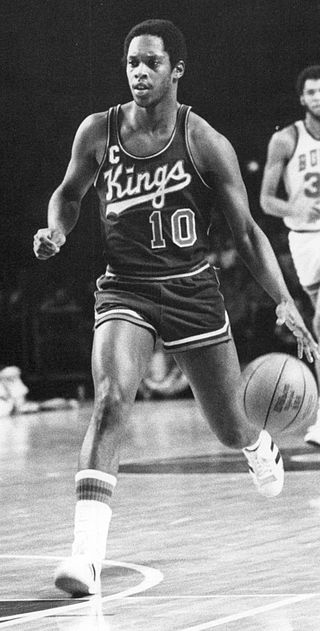
Nathaniel "Tiny" Archibald is an American retired professional basketball player. He spent 14 years playing in the National Basketball Association (NBA), most notably with the Cincinnati Royals/Kansas City–Omaha Kings and Boston Celtics. In 1991, he was enshrined into both the Naismith Memorial Basketball Hall of Fame and the New York City Basketball Hall of Fame.
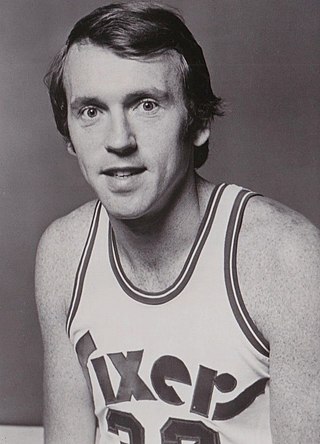
William John Cunningham is an American former professional basketball player and coach, who was nicknamed the Kangaroo Kid for his leaping and record-setting rebounding abilities. He spent a total of 17 seasons with the NBA's Philadelphia 76ers, and two seasons as a player with the Carolina Cougars of the ABA.

K.C. Jones was an American professional basketball player and coach. He is best known for his association with the Boston Celtics of the National Basketball Association (NBA), with whom he won 11 of his 12 NBA championships. As a player, he is tied for third for most NBA championships in a career, and is one of three NBA players with an 8–0 record in NBA Finals series. He is the only African-American coach other than Bill Russell to have won multiple NBA championships. Jones was inducted into the Naismith Memorial Basketball Hall of Fame in 1989.

The 1973 NBA draft was the 27th annual draft of the National Basketball Association (NBA). The draft was held on April 24 and May 5, 1973, before the 1973–74 season. In this draft, 17 NBA teams took turns selecting amateur U.S. college basketball players and other eligible players, including international players. The first two picks in the draft belonged to the teams that finished last in each conference, with the order determined by a coin flip. The Philadelphia 76ers won the coin flip and were awarded the first overall pick, while the Portland Trail Blazers were awarded the second pick. The remaining first-round picks and the subsequent rounds were assigned to teams in reverse order of their win–loss record in the previous season. Prior to the draft, the Baltimore Bullets relocated to Landover, Maryland, and became the Capital Bullets. The Philadelphia 76ers were awarded an extra first-round draft pick as compensation when the Seattle SuperSonics signed John Brisker. A player who had finished his four-year college eligibility was eligible for selection. If a player left college early, he would not be eligible for selection until his college class graduated. Before the draft, 11 college underclassmen were declared eligible for selection under the "hardship" rule. These players had applied and gave evidence of financial hardship to the league, which granted them the right to start earning their living by starting their professional careers earlier. The draft consisted of 20 rounds comprising the selection of 211 players.
The 1974 NBA draft was the 28th annual draft of the National Basketball Association (NBA). The draft was held on May 28, 1974, before the 1974–75 season. In this draft, 18 NBA teams took turns selecting amateur U.S. college basketball players and other eligible players, including international players. The first two picks in the draft belonged to the teams that finished last in each conference, with the order determined by a coin flip. The Portland Trail Blazers won the coin flip and were awarded the first overall pick, while the Philadelphia 76ers were awarded the second pick. The remaining first-round picks and the subsequent rounds were assigned to teams in reverse order of their win–loss record in the previous season. Prior to the draft, the Capital Bullets were renamed the Washington Bullets. An expansion franchise, the New Orleans Jazz, took part in the NBA Draft for the first time and were assigned the tenth pick in each round. A player who had finished his four-year college eligibility was eligible for selection. If a player left college early, he would not be eligible for selection until his college class graduated. Before the draft, 20 college underclassmen were declared eligible for selection under the "hardship" rule. These players had applied and gave evidence of financial hardship to the league, which granted them the right to start earning their living by starting their professional careers earlier. The draft consisted of 10 rounds comprising the selection of 178 players.
The 1972 NBA draft was the 26th annual draft of the National Basketball Association (NBA). The draft was held on April 10 and 15, 1972 before the 1972–73 season. In this draft, 17 NBA teams took turns selecting amateur U.S. college basketball players and other eligible players, including international players. The first two picks in the draft belonged to the teams that finished last in each conference, with the order determined by a coin flip. The Portland Trail Blazers won the coin flip and were awarded the first overall pick, while the Buffalo Braves were awarded the second pick. The remaining first-round picks and the subsequent rounds were assigned to teams in reverse order of their win–loss record in the previous season. As a result of last year's supplemental hardship draft, the Cincinnati Royals, the Atlanta Hawks, the Golden State Warriors and the Baltimore Bullets forfeited their first-round picks, while the Los Angeles Lakers forfeited their fourth round pick. Prior to the start of the season, the Cincinnati Royals relocated and became the Kansas City-Omaha Kings. The draft consisted of 18 rounds comprising the selection of 198 players.
The 1971 NBA draft was the 25th annual draft of the National Basketball Association (NBA). The draft was held on March 29 and 30, 1971, before the 1971–72 season. In this draft, 17 NBA teams took turns selecting amateur U.S. college basketball players and other eligible players, including international players. A player who had finished his four-year college eligibility was eligible for selection. If a player left college early, he would not be eligible for selection until his college class graduated. The first two picks in the draft belonged to the teams that finished last in each conference, with the order determined by a coin flip. The Cleveland Cavaliers won the coin flip and were awarded the first overall pick, while the Portland Trail Blazers were awarded the second pick. The remaining first-round picks and the subsequent rounds were assigned to teams in reverse order of their win–loss record in the previous season. Prior to the start of the season, the San Diego Rockets and the San Francisco Warriors relocated to Houston, Texas, and Oakland, California, and became the Houston Rockets and Golden State Warriors respectively. The draft consisted of 19 rounds comprising the selection of 237 players. The league also hosted a supplemental hardship draft on September 20, 1971, for college underclassmen who wished to join the league.
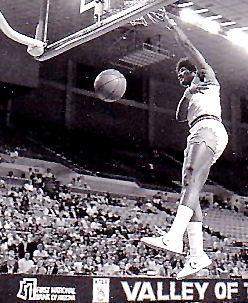
Ronald Henry Lee is an American former basketball player who played six seasons in the National Basketball Association (NBA). He played college basketball for the University of Oregon, and epitomized the "Kamikaze Kids" under coach Dick Harter with his all-out, fearless hustle and relentless desire to win. Born in Boston, Massachusetts, Lee played four seasons for the Ducks between 1972 and 1976. The Phoenix Suns made him the tenth selection in the NBA draft in 1976. Despite not playing football in high school and college, the NFL's San Diego Chargers also made him a 12th round selection in the 1976 NFL draft. In the NBA, Lee was named to the 1977 NBA All-Rookie Team and led the NBA in steals the following season. Overall, Lee had a solid, but not spectacular career as a reserve, and became a fan favorite because of his effort on the court.

James Bernett “Bunny” Chones is an American former professional basketball player, and current radio analyst for the Cleveland Cavaliers.
James Turner Brewer is an American former National Basketball Association (NBA) player.
David "Corky" Calhoun is an American former professional basketball player. Calhoun played in the NBA from 1972 to 1980 after a collegiate career at the University of Pennsylvania. Calhoun was the 1st round selection of the Phoenix Suns in the 1972 NBA draft. He won an NBA Championship as a member of the 1976–1977 Portland Trail Blazers.













